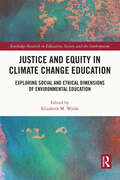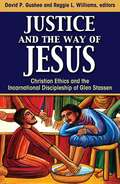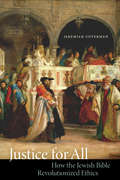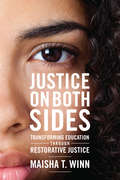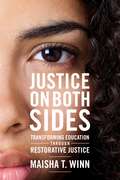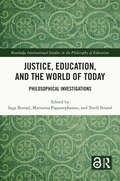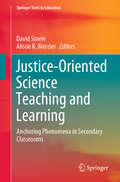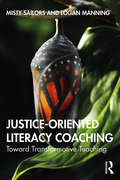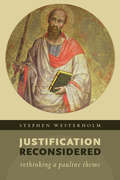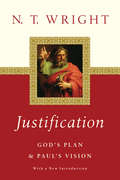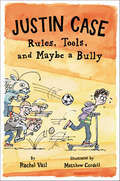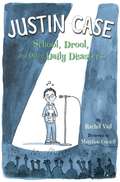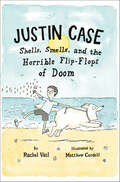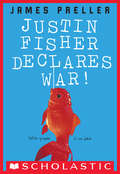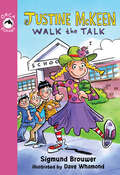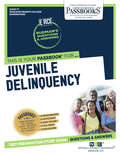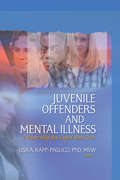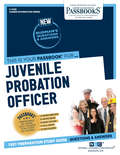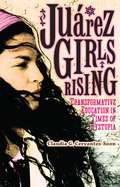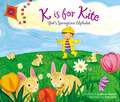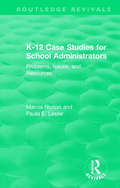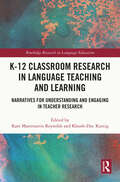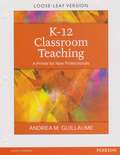- Table View
- List View
Justice and Equity in Climate Change Education: Exploring Social and Ethical Dimensions of Environmental Education (Routledge Research in Education, Society and the Anthropocene)
by Elizabeth M. WalshThis volume looks at the ways in which climate change education relates to broader ideas of justice, equity, and social transformation, and ultimately calls for a rapid response to the need for climate education reform. Highlighting the role of climate change in exacerbating existing societal injustices, this text explores the ethical and social dimensions of climate change education, including identity, agency, and societal structure, and in doing so problematizes climate change education as an equity concern. Chapters present empirical analysis, underpinned by a theoretical framework, and case studies which provide critical insights for the design of learning environments, curricula, and everyday climate change-related learning in schools. This text will benefit researchers, academics, educators, and policymakers with an interest in science education, social justice studies, and environmental sociology more broadly. Those specifically interested in climate education, curriculum studies, and climate adaption will also benefit from this book.
Justice and Equity in Climate Change Education: Exploring Social and Ethical Dimensions of Environmental Education (Routledge Research in Education, Society and the Anthropocene)
by Elizabeth M. WalshThis volume looks at the ways in which climate change education relates to broader ideas of justice, equity, and social transformation, and ultimately calls for a rapid response to the need for climate education reform. Highlighting the role of climate change in exacerbating existing societal injustices, this text explores the ethical and social dimensions of climate change education, including identity, agency, and societal structure, and in doing so problematizes climate change education as an equity concern. Chapters present empirical analysis, underpinned by a theoretical framework, and case studies which provide critical insights for the design of learning environments, curricula, and everyday climate change-related learning in schools. This text will benefit researchers, academics, educators, and policymakers with an interest in science education, social justice studies, and environmental sociology more broadly. Those specifically interested in climate education, curriculum studies, and climate adaption will also benefit from this book.
Justice and the Way of Jesus: Christian Ethics and the Incarnational Discipleship of Glen Stassen
by David P. Gushee and Reggie L. WilliamsThis edited volume will offer a rich engagement with the theological ethics of Glen Stassen (1936-2014). Eighteen Christian theologians and ethicists, mainly of senior status, will particularly engage Stassen’s last major theological-ethical proposal, encapsulated in his term “incarnational discipleship.” By this term, Stassen intended a statement of the central norm or framework for Christian ethics grounded in the holistic sovereignty of God over all of life, the Lordship of a thick, historical, incarnate, realistic Jesus, and a Holy Spirit who frees believers from any ideological captivities that block our obedience to our Sovereign God and the Lord Jesus Christ. Stassen thought he had arrived at such a pivotal insight that he hoped it would catch on and become a major concept across the discipline, something like Christian realism, liberation ethics, or narrative ethics. However, he died before he had the opportunity to do more than propose the concept.
Justice for All: How the Jewish Bible Revolutionized Ethics (JPS Essential Judaism)
by Jeremiah UntermanJustice for All demonstrates that the Jewish Bible, by radically changing the course of ethical thought, came to exercise enormous influence on Jewish thought and law and also laid the basis for Christian ethics and the broader development of modern Western civilization. Jeremiah Unterman shows us persuasively that the ethics of the Jewish Bible represent a significant moral advance over Ancient Near East cultures. Moreover, he elucidates how the Bible’s unique conception of ethical monotheism, innovative understanding of covenantal law, and revolutionary messages from the prophets form the foundation of many Western civilization ideals. Justice for All connects these timeless biblical texts to the persistent themes of our times: immigration policy, forgiveness and reconciliation, care for the less privileged, and attaining hope for the future despite destruction and exile in this world.
Justice on Both Sides: Transforming Education Through Restorative Justice (Race and Education)
by Maisha T. WinnRestorative justice represents &“a paradigm shift in the way Americans conceptualize and administer punishment,&” says author Maisha T. Winn, from a focus on crime to a focus on harm, including the needs of both those who were harmed and those who caused it. Her book, Justice on Both Sides, provides an urgently needed, comprehensive account of the value of restorative justice and how contemporary schools can implement effective practices to address inequalities associated with race, class, and gender. Winn, a restorative justice practitioner and scholar, draws on her extensive experience as a coach to school leaders and teachers to show how indispensable restorative justice is in understanding and addressing the educational needs of students, particularly disadvantaged youth. Justice on Both Sides makes a major contribution by demonstrating how this actually works in schools and how it can be integrated into a range of educational settings. It also emphasizes how language and labeling must be addressed in any fruitful restorative effort. Ultimately, Winn makes the case for restorative justice as a crucial answer, at least in part, to the unequal practices and opportunities in American schools.
Justice on Both Sides: Transforming Education through Restorative Justice (Race and Education)
by Maisha T. WinnRestorative justice represents “a paradigm shift in the way Americans conceptualize and administer punishment,” says author Maisha T. Winn, from a focus on crime to a focus on harm, including the needs of both those who were harmed and those who caused it. Her book, Justice on Both Sides, provides an urgently needed, comprehensive account of the value of restorative justice and how contemporary schools can implement effective practices to address inequalities associated with race, class, and gender. <p><p> Winn, a restorative justice practitioner and scholar, draws on her extensive experience as a coach to school leaders and teachers to show how indispensable restorative justice is in understanding and addressing the educational needs of students, particularly disadvantaged youth. Justice on Both Sides makes a major contribution by demonstrating how this actually works in schools and how it can be integrated into a range of educational settings. It also emphasizes how language and labeling must be addressed in any fruitful restorative effort. Ultimately, Winn makes the case for restorative justice as a crucial answer, at least in part, to the unequal practices and opportunities in American schools.
Justice, Education, and the World of Today: Philosophical Investigations (Routledge International Studies in the Philosophy of Education)
by Marianna Papastephanou Torill Strand Inga BostadThis edited book challenges the limits of current educational philosophical discourse and argues for a restored normativisation of education through a powerful notion of justice. Moving beyond conventional paradigms of how justice and education relate, the book rethinks the promotion of justice in, for, and through education in its current state. Chapters combine international and diverse philosophical perspectives with a focus on contemporary issues such as climate change, the COVID-19 pandemic, racism, and migrant crises. Divided into three distinct parts, the book explores the ontological and socio-political grounds underlying our notions of education and justice, and offers self-reflective meta-critique on education philosophers’ tendency of promoting and upholding orthodox visions and missions. Ultimately, the book offers contemporary and innovative philosophical reflections on the link between justice and education, and enriches the discourse through a multi-perspectival and sensitive exploration of the topic. It will be of great interest to scholars, researchers, and postgraduate students in the fields of philosophy of education, education policy and politics, education studies and social justice.
Justice, Education, and the World of Today: Philosophical Investigations (Routledge International Studies in the Philosophy of Education)
by Marianna Papastephanou Torill Strand Inga BostadThis edited book challenges the limits of current educational philosophical discourse and argues for a restored normativisation of education through a powerful notion of justice.Moving beyond conventional paradigms of how justice and education relate, the book rethinks the promotion of justice in, for, and through education in its current state. Chapters combine international and diverse philosophical perspectives with a focus on contemporary issues, such as climate change, the COVID-19 pandemic, racism, and migrant crises. Divided into three distinct parts, the book explores the ontological and socio-political grounds underlying our notions of education and justice, and offers self-reflective meta-critique on education philosophers’ tendency of promoting and upholding orthodox visions and missions. Ultimately, the book offers contemporary and innovative philosophical reflections on the link between justice and education, and enriches the discourse through a multi-perspectival and sensitive exploration of the topic. It will be of great interest to scholars, researchers, and postgraduate students in the fields of philosophy of education, education policy and politics, education studies, and social justice.The Open Access version of this book, available at www.taylorfrancis.com, has been made available under a Creative Commons Attribution-Non Commercial-No Derivatives 4.0 license. Funded by University of Oslo.
Justice-Oriented Science Teaching and Learning: Anchoring Phenomena in Secondary Classrooms (Springer Texts in Education)
by David Steele Alison K. MercierThis textbook provides K-12 science teachers and educators innovative uses of anchoring phenomenon-based teaching approaches from a justice-oriented lens (Morales-Doyle, 2017). It discusses topics such as the use of anchoring phenomenon-based pedagogies, qualities of productive anchoring phenomena and includes examples of unit plans that use anchoring phenomena and social justice science issues to create storylines to foster students’ multiple pathways to knowing and learning in the science classrooms. The book is beneficial to K-12 science teachers and science educators who are interested in facilitating students’ sense-making of a real-world phenomenon and engaging in three-dimensional science instruction (NGSS Lead States, 2013). By providing examples of unit plans based on theoretical groundings of anchoring phenomenon-based instruction and justice-oriented science teaching, this book provides a great resource to students, professionals, teachers, and academics in science education.
Justice-oriented Literacy Coaching: Toward Transformative Teaching
by Misty Sailors Logan ManningThis book explores notions of justice-oriented literacy coaching and offers a way of being in the world with young people, teachers, and communities that centers transformative coaching, teaching, and learning. It is intended to disrupt the traditional and historical positioning of literacy coaches in schools today. Through the lens of social justice and liberatory education, Sailors and Manning begin a dialogue with literacy coaches to help them reconsider their own roles and positions as agents of change in schools. Using vignettes and stories to illustrate potential paths into emancipatory literacy learning environments, the authors present literacy as a socially-situated act of meaning-making. Accessible and inviting, this book provides pragmatic tools for literacy leaders to embody social justice, to grapple with big social concepts, to imagine possibilities, and to stimulate creative thinking with the teachers at their schools and with the students in their classrooms. Intended for literacy coaches in grades K-6 and graduate students in literacy education, this book includes a wealth of resources and examples from real-world contexts, as well as spaces for the reader to interact and engage with the text through journaling and self-reflection.
Justification Reconsidered: Rethinking A Pauline Theme
by Stephen WesterholmMuch has been written of late about what the apostle Paul really meant when he spoke of justification by faith, not the works of the law. This short study by Stephen Westerholm carefully examines proposals on the subject by Krister Stendahl, E. P. Sanders, Heikki Raisanen, N. T. Wright, James D. G. Dunn, and Douglas A. Campbell. In doing so, Westerholm notes weaknesses in traditional understandings that have provoked the more recent proposals, but he also points out areas in which the latter fail to do justice to the apostle.Readers of this book will gain not only a better grasp of the ongoing theological debate about justification but also a more nuanced overall understanding of Paul.
Justin Case: Rules, Tools, and Maybe a Bully (Justin Case Series)
by Rachel VailJustin Case made it through third grade and summer camp in the previous two books. Now he's in fourth grade, and there's even more to worry about: friends, bullies, grades, tests—and did we say bullies? Once again, Rachel Vail and Matthew Cordell bring to life all the worries and triumphs of elementary school life, in diary form. Fans will relate to Justin and his adventures.
Justin Case: School, Drool, And Other Daily Disasters
by Rachel Vail Matthew CordellIt's the start of the school year, and nothing feels right to Justin. He didn't get the teacher he wanted, he's not in the same class as his best friend, and his little sister, Elizabeth, is starting kindergarten at his school. Elizabeth doesn't seem nervous at all. Justin is very nervous about third grade. And to top it off, he's lost his favorite stuffed animal, but he can't tell anyone, because technically he's too old to still have stuffed animals. Right? Here is third grade in all its complicated glory--the friendships, the fears, and the advanced math. Acclaimed author Rachel Vail captures third grade with a perfect pitch, and Matthew Cordell's line art is both humorous and touching. As Justin bravely tries to step out of his shell, he will step into readers' hearts.
Justin Case: Shells, Smells, and the Horrible Flip-Flops of Doom (Justin Case Series)
by Rachel VailJustin is going to start fourth grade—but first, he has to survive the summer. He "gets" to go to camp every day on a bus. He "gets" to experience all sorts of new things: Bugs. Mess hall food. Flip-flops (they hurt the space between his toes and they're hard to walk in). And (gulp!) swimming. Justin's little sister, Elizabeth, seems to deal with camp just fine. So do his friends. Justin is trying very hard not to be a worried kid anymore, especially when it comes to making friends at camp, including a new kid who is kind of . . . rough. After all, Justin is going to be in fourth grade. It's time to be brave. Right?
Justin Fisher Declares War!
by James PrellerFifth grade is no joke! James Preller takes on the class clown in this new school story, full of humor, hijinks, and heart.At Spiro Agnew Elementary, the fifth graders rule the school. And class clown Justin Fisher rules them all.Or, at least, he did.Justin has always been the funniest kid in school. But this year, his new teacher isn't amused. And when Justin gets in trouble with Mr. Tripp over and over, the other kids turn on him, too. No one wants to be friends with the class troublemaker.But Justin Fisher isn't going down without a fight.
Justine McKeen, Walk the Talk (Orca Echoes)
by Sigmund BrouwerMeet Justine McKeen. She's the Queen of Green! She talks a little too much, bosses a little too much and tells the truth, just not all at once. She's trying to save the planet, one person at a time, and when she decides to get something done, it's a lot of fun. In Justine McKeen, Walk the Talk, the second book in the Justine McKeen series, Justine decides there are too many cars idling in front of her school. So she comes up with a solution that should help keep the air cleaner. But she soon discovers not many adults trust her crazy ideas.
Juvenile Delinquency: Passbooks Study Guide (Excelsior/Regents College Examination Series)
by National Learning CorporationThe Excelsior/Regents College Examinations (E/RCE) offer you an opportunity to obtain recognition for college-level learning and consists of exams designed to demonstrate achievement and mastery of various college-level subjects, such as the Arts and Sciences, Business, Criminal Justice, Education, Health and Nursing. The E/RCE Juvenile Delinquency Passbook® prepares you by sharpening knowledge of the skills and concepts necessary to succeed on the upcoming exam and the college courses that follow. It provides a series of informational texts as well as hundreds of questions and answers in the areas that will likely be covered on your upcoming exam.
Juvenile Offenders and Mental Illness: I Know Why the Caged Bird Cries
by Lisa A. Rapp-PaglicciGet the latest research on juvenile offenders who have a mental illnessMost youths in the juvenile justice system who have one or more mental disorders do not receive proper treatment or education, nor do they serve sentences appropriate for their crimes. Juvenile Offenders and Mental Illness: I Know Why the Caged Bird Cries takes a detailed look at the latest theories and empirically based information on the causal and recidivism problems youths with mental disorders face in the juvenile justice system. Respected experts comprehensively discuss the range of problems found in the assessment of mentally ill juvenile offenders and offer practical, effective treatment solutions.Juvenile Offenders and Mental Illness explains the cost-effective methodologies and presents the latest data on recidivism rates and occurrences of depression, Attention Deficit Hyperactivity Disorder (ADHD), and/or alcohol or substance abuse disorder among delinquent adolescents. Research studies also include data gleaned from the application of the Piers-Harris Children&’s Self-Concept Scale, the Beck Hopelessness Scale, and other scales and surveys on participants. Other topics include revealing data on the prevalence of lifetime use of Ecstasy (MDMA) and its effects; female shoplifting and its relationship to mental illness; incidence of trauma exposure in incarcerated youth; and strategies to enhance the effectiveness of interventions. The book includes helpful tables to clearly illustrate empirical data and provides detailed references for each chapter.Juvenile Offenders and Mental Illness provides the freshest research and insightful discussion on: adolescent stalking depression ADHD alcohol/substance abuse disorders Post Traumatic Stress Disorder (PTSD) Ecstasy (MDMA) use and its association with symptoms of anxiety or depression the impact of mental health treatment intensity on the emotional and behavioral problems of youth in a treatment facility shoplifting by female teens behavioral problems and suicide-tendency in youths who have been sexually abused or traumatized effective prevention and the reduction of violence by at-risk adolescentsJuvenile Offenders and Mental Illness: I Know Why the Caged Bird Cries provides vital research data and treatment options for social workers, forensic psychologists, and those working in the juvenile justice system.
Juvenile Probation Officer: Passbooks Study Guide (Career Examination Series)
by National Learning CorporationThe Juvenile Probation Officer Passbook® prepares you for your test by allowing you to take practice exams in the subjects you need to study. It provides hundreds of questions and answers in the areas that will likely be covered on your upcoming exam, including but not limited to: records and reports; interviewing; adult and child psychology; and more.
Juárez Girls Rising: Transformative Education in Times of Dystopia
by Claudia G. Cervantes-SoonWorking-class girls in Ciudad Juárez grow up in a context marked by violence against women, the devastating effects of drug cartel wars, unresponsive and abusive authorities, and predatory U.S. capitalism: under constantly precarious conditions, these girls are often struggling to shape their lives and realize their aspirations. Juárez native Claudia G. Cervantes-Soon explores the vital role that transformative secondary education can play in promoting self-empowerment and a spirit of resistance to the violence and social injustice these girls encounter.Bringing together the voices of ten female students at Preparatoria Altavista, an innovative urban high school founded in 1968 on social justice principles, Cervantes-Soon offers a nuanced analysis of how students and their teachers together enact a transformative educational philosophy that promotes learning, self-authorship, and hope. Altavista&’s curriculum is guided by the concept of autogestión, a holistic and dialectical approach to individual and collective identity formation rooted in the students&’ experiences and a critical understanding of their social realities. Through its sensitive ethnography, this book shows how female students actively construct their own meaning of autogestión by making choices that they consider liberating and empowering.Juárez Girls Rising provides an alternative narrative to popular and often simplistic, sensationalizing, and stigmatizing discourses about those living in this urban borderland. By merging the story of Preparatoria Altavista with the voices of its students, this singular book provides a window into the possibilities and complexities of coming of age during a dystopic era in which youth hold on to their critical hope and cultivate their wisdom even as the options for the future appear to crumble before their eyes.
K Is for Kite: God's Springtime Alphabet
by Kathy-jo WarginAs soft April showers make our hearts sing, let’s find the sweetness of God’s gentle spring. Discover both God’s world and the alphabet through the refreshing newness of springtime experiences. Beautiful illustrations and playful poetry fill this book with everything spring from A to Z. From the first April shower to flying kites and playing in puddles, young readers will delight in the uplifting seasonal message and will grow in their appreciation of the spring season and the miracle of new beginnings.
K-12 Case Studies for School Administrators: Problems, Issues, and Resources (Routledge Revivals #Vol. 52)
by Marcia Norton Paula E. LesterCase studies enable aspiring administrators to refine their reaction skills as well as their critical-thinking skills by responding to a multitude of problems in a short time. Originally published in 1998, the case studies in this book provide a broad-based overview of the kinds of real problems that schools were facing at the time. The problems administrators face on a daily basis vary in scope and complexity. Short cases provide opportunities to address, analyse, and resolve problems encountered in the real working environment. Students must actively engage in a process of inquiry and problem solving. This book can be used over several years according to the case studies selected for class use. This is a multicourse, multiyear action case-study text.
K-12 Classroom Research in Language Teaching and Learning: Narratives for Understanding and Engaging in Teacher Research (Routledge Research in Language Education)
by Khanh-Duc KuttigThis edited volume presents narratives on a range of methods for research on second language teaching and learning appropriate to the elementary, middle, and high schools (K-12). Teacher researchers in different worldwide contexts narrate their processes to explain and demonstrate practitioner research in context; contributors describe their research from exploring the rationale for the project, to designing the study, analyzing the data, and disseminating it. As such, the book illustrates how K-12 practitioners design, gather, analyze, interpret, and strategically employ data to make data-driven, evidence-based, and analysis-informed instructional, assessment, and programmatic decisions. This volume empowers teacher-researchers and allows them to envision research projects in their own classrooms. Offering new insights into the researchers’ thinking processes, challenges, and solutions, and advocating teacher research for understanding learning, the teaching of language, and the development of SLA, this text will appeal to educators and researchers involved in language education, second language acquisition, TESOL, ESL/EFL/ELT, and applied linguistics.
K-12 Classroom Teaching
by Andrea M. GuillaumeThis research-based, yet practical book looks at the meaning and direction behind new teachers’ actions related to a number of central educational issues. In clear, concise, reader-friendly language, it explores key aspects of classroom teaching, including 21st century teaching and learning, strategies for learning about students and their families, educational stances, planning and assessment, inclusive and responsive instruction, instructional models and strategies, classroom management and discipline, and professional growth. Throughout the book the author balances up-to-date discussions of educational issues, research findings, and practical advice to give future and new teachers a look at the active nature of learning to teach. Thoroughly updated with hundreds of new citations and recent trends such as national demographic shifts, international and national assessment practices and results; Positive Behavior Interventions and Support; bullying; and issues around GLBTQ students and students with GLBTQ families, K-12 Classroom Teaching now includes chapter outcomes with quick check items, a new Watch and Think feature with links to videos, and guiding questions to promote exploration and expansion of the content presented in each chapter. The Enhanced Pearson eText features embedded video and assessments.
